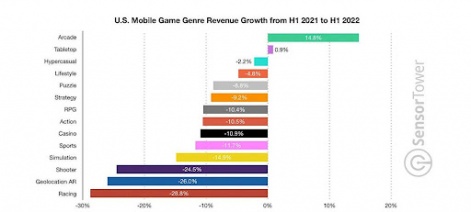Mobile game development used to be led by the plucky indie developer. A combination of aspiring new talent or veterans who were tired of the PC/Console grind. However, over the last year we have seen a rapid decline of the smaller teams focused on mobile development.
Fourteen years ago the Appstore changed everything about mobile games, a movement led by crazy innovators like Rovio and Supercell as well as one-man bands like HandCircus with Rolando or, dare I say, Dong Nguyen and the original Flappy Bird (OK I admit that was from 2013).
Over the last year in particular, we have seen a considerable decline in the number of mobile games being shown off at the Big Indie Pitch or even presented to us (as a publisher) at events. But despite that we still see plenty of PC games coming through.
Sensor Tower produced a report earlier this year showing a decline in the revenues by genre in mobile as follows:

However, to my mind this is a general post-pandemic hang-over. Now people are (mostly) back in the normality, I think these numbers were an inevitable consolidation. However, I think to understand what’s happening to Indies we need to think about the factors which affect them directly.
There have been lots of reasons why staying competitive in the mobile scene is difficult and these include:
Free2Play: Mobile is a Free2Play environment and that is challenging for a lot of Indie Devs. It takes a different set of skills to consider the commercial design alongside gameplay. A lot of indies try to brave it out with the premium market on mobile but this is super difficult. There are some outliers such as The Room, Monument Valley or BloonsTD that set a price and quality bar that seems to work, but arguably most of the games that pull this off have an existing audience who already love the game on other platforms. Some attempts have been made to support this kind of content. Not least Apple Arcade and Netflix offering subscription services. However, that business model is just not as effective as free with opt-in Ads.
HyperCasual: Pre-Pandemic saw the rise of the most disposable variation of simplified gameplay. Games designed to be played intensely, drive ad views and then be discarded. There is a lot to be said for this model, not least that it really used data to kill games incredibly fast, early and cheaply. However, with Apple’s removal of IDFA as well downward spiralling economic environment times are harder than before. A lot fewer publishers out there are talking about paying to support a pool of indie developers than before the pandemic.
Funding: Mobile doesn’t seem to have the same pipeline to funding a game as we have in PC or Console. Publishers need to see data BEFORE they invest and that means that the developers have to bootstrap their game further down the development path. Given the level of risk involved its understandable that Indies will be looking at easier pathways.
LiveOps: Managing the game in live is now the norm for mobile, and whilst this is also affecting the PC/Console space its vital for mobile. Too few indie devs have the skills or experience to manage their game long term, and too few publishers offer the expertise or team to do it for them.
AppStores: Working within the discovery constraints of the mobile app stores is challenging and requires a lot of expertise in social and paid User Acquisition to get ahead. The IDFA changes mean that we need to have had to change focus from direct targeting to making sure that we have the creative (trailer) design that will intrinsically attract attention. That’s a separate skill in its own right from game development. Too few Indie developers also have the marketing skills to manage Social. UA and AppStore Optimisation as well.
Despite the decline outlined by reports from Sensor Tower and the like, Mobile game development remains the most successful sector of the industry and that is likely to remain the case for the foreseeable future. However, the complexity of the design challenge of gameplay, marketing, retention, live-ops, and monetisation require strategies that make it difficult for indie developers to compete.
However, all is not lost. We know that innovation comes out of the indie scene and there are some teams out there, looking for the next big game.
About Oscar Clark
Oscar Clark literally wrote the book on Games as a service, and is Chief Strategy Officer at Fundamentally Games LTD, a publisher of living games committed to transparency and genuine partnership with developers.
About Fundamentally Games
Fundamentally Games Ltd was founded in 2019 to focus on bringing games to live, helping game developers with managing live operations to scale their game. Their engagement-led strategy aims to scale games faster by getting more players, doing more things, more often and for longer. Now offering publishing and UA funding with a commitment to transparency and genuine partnership with developers.






















